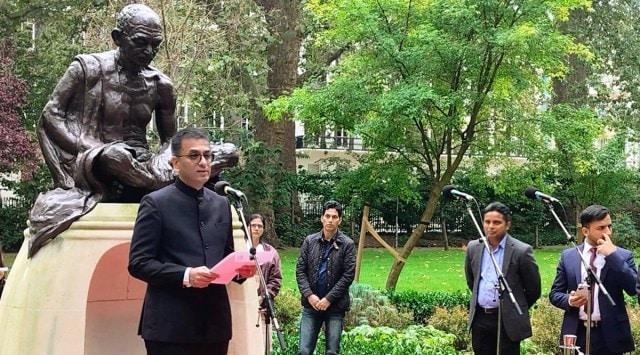Mahatma’s message of harmony and tolerance a beacon of hope, wisdom: CJI Chandrachud
The Chief Justice highlighted Mahatma Gandhi's commitment to social justice and equality, which continues to inspire people to fight against injustices.
 Chief Justice of India D Y Chandrachud at the Gandhi Jayanti celebrations in London, Monday. (PTI)
Chief Justice of India D Y Chandrachud at the Gandhi Jayanti celebrations in London, Monday. (PTI) Mahatma Gandhi’s “ideas have persisted over time as a tool of social change, non-violent ways of life and humanism” and his “message of harmony and tolerance stands as a beacon of hope and wisdom…in today’s globalised world”, Chief Justice of India D Y Chandrachud said on Monday.
Speaking at the Gandhi Jayanti celebrations in Tavistock Square in London, the CJI said, “Gandhiji’s name is one which is known to everyone in the world…which stands for the principle of truth and non-violence…which calls for universal peace…which inspires hope that we shall make our world a better place than it was before”.
The CJI said that “in a spiritual sense, he is a guiding light for all of us” and that his “legacy extends far beyond the boundaries of India’. “His ideas have inspired countless individuals and people’s movements around the world, transcending cultural and geographical barriers. His philosophy continues to influence and guide those who strive for a more equitable and just society. Bapu’s core philosophy of non-violence and universalism are grounded on the fact that the world is one and there is a need for harmony and fraternity among the people. This idea captures the basis of moral obligations of humanism as a society. Bapu’s vision for humanity was a testament of his commitment towards peaceful co-existence for a united world,” CJI Chandrchud said.
He pointed out that Gandhiji’s “teachings on unity and respect for diversity are timeless and hold immense significance in our modern society” and said that “as we navigate through complex global challenges, it is essential that we preserve and promote Bapu’s legacy. His principles of understanding each other and empathy are more important than ever. By embracing and practising these values, the world can foster a culture of inclusivity and acceptance”.
The CJI said that Mahatma Gandhi’s “lessons on sustainability are guiding light for today’s world. As we face the pressing issue of climate change and environmental challenges, his emphasis on living in harmony with nature and practising sustainable lifestyles provides us with valuable guidance. Bapu believed in the philosophy of “plain living and high thinking”, thus advocating for a lifestyle that is mindful of our impact on the environment. His ideas on sustainability remind us of the importance of contentment and responsible consumption, conservation of resources, and the need to protect the natural world for future generations”.
CJI Chandrachud added that his “commitment to social justice and equality continues to inspire us to fight against injustices. His unwavering belief in the inherent dignity and worth of every individual serves as a reminder that we must strive for a society where everyone is treated with fairness and respect. Bapu’s vision of a more equitable and just society encourages us to challenge systems of oppression, advocate for the rights of marginalised communities, and work towards creating a society where everyone has equal opportunities and access to basic necessities”. The CJI said that Gandhiji’s “life has left an indelible mark on humanity. His understanding of non-violence as the foundation for the search for truth, his vision of a united and harmonious world, and his advocacy for sustainability, social justice, and equality continue to guide us in our pursuit of a better future. His belief in Vasudev Kutumbakam (the entire world is one family) encourages us to believe that we all are citizens of one world, and that we must remain conscious of global issues”.







